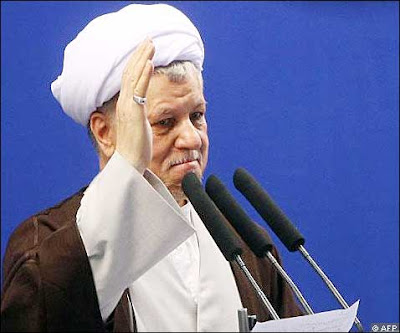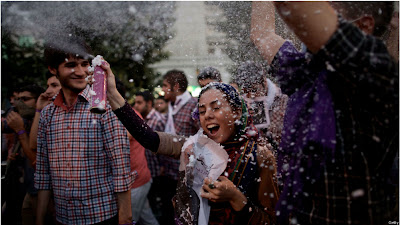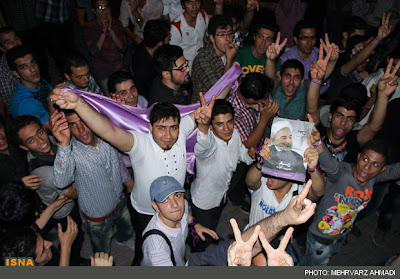BEHROOZ GHAMARI
In my last blog I said that on a good day Rouhani might even
win the absolute majority and become the president in the first round. Well, it
was a good day and he did win in a landslide. Here are some numbers for those
of us who don’t believed anything unless it is quantified:
Participation: 72% (36 million out of 50 million eligible
voters)
Rouhani: 50.70%
Qalbaf: 16.5%
Jalili: 11.3%
Reza’ei: 10.5%
Velayati: 6.1%
Gharazi: 1.2%
Invalid votes (known in the US as “hanging chads”): 1.2
million
 |
| Participation was so unanticipated that the government had to extend the voting hours three times. |
By all measures, this was a surprise election, both in terms
of participation rate as well as the fact that it produced a winner in the
first round in a 6-way race. I think more than the shock of winning, it is the
shock of losing that defines the outcome of this election, the shock of losing
so dismally, that is, for the Supreme Leader.
When he was disqualified from running for presidency, Rafsanjani
endorsed Hassan Rouhani, a moderate cleric with unimpeachable credentials as a
loyal politician. Whereas Rafsanjani devised a clear strategic plan to restore
his political authority, Khamenei and his conservative principlist allies struggled
to put together a joint platform and a winning strategy to maintain their hold
of the highest executive office.
First they formed the 2+1 in order to defend principlist
conservatism from Ahmadinejad deviations and revisionism. The goal was to
generate some momentum for a new alternative to the madness of Ahmadinejad
without abandoning his populism and uncompromising, confrontational politics.
Then Saeed Jalili entered the scene and every one thought that he will be the Supreme Leader’s “real Man.”
But then, some others opined that Jalili might operate as Ahmadinjead’s Trojan
Horse and must be stopped before getting inside the Supreme Leader’s quarters. The
last minute effort to gather support for Velayati as the “establishment’s
candidate,” also bore no fruits.
Many commentators repeated the tired rhetoric that the
elections in Iran are meaningless and are merely performances to endow
legitimacy to the wishes of the Supreme Leader. Despite the fact that the
Supreme Leader himself could not identify whom he favored among the eight
candidates, the hawkish Iranian opposition and their Western supporters believed
peoples’ vote to be irrelevant.
There are two big losers in this election. First: The
Supreme Leader, who made the grave mistake of endorsing the policies of
Ahmadinejad, thus turning the election into a referendum on himself.
 |
| Velayati, the Supreme Leader's trusted adviser, ended his race with a meager 6% of the vote! |
Second: Those who pursue a regime change in Iran and believe
that “crippling sanctions” (in the best case scenario) or “military
intervention” (the worst case scenario) will eventually force Iranian people to
rise up against the Islamic Republic and topple the regime. Every time there is
an election in Iran, they repeat the same mistake that people will not
participate and thereby will delegitimize the regime.
What exactly people have voted for is generally clear.
Rouhani’s campaign successfully linked the economic crisis in the country (high
inflation rate, unemployment, devaluation of the Iranian currency) to the current
administration’s incompetence both in terms of economic planning as well as
their confrontational and provocative international policy (mostly on the
nuclear negotiations). The United Nations and the United States sanctions
against Iran have exacerbated already difficult economic conditions in the
country. For years Ahmadinejad argued that his administration welcomes these
sanctions because they will lead to more innovation and less dependence on
foreign powers. Neither happened.
Next to an international détente, Rouhani also stroke a
similar chord when during the debates he argued that the best assurance against
economic corruption and mismanagement is a free press and the freedom of
expression. Easing of social restrictions and the protection of civil liberties
are going to be more challenging for the Rouhani administration as he also has
the backing of many social conservatives whose political capital is going to be
a major asset in delivering his campaign promises.
Next month, right after Rouhani officially begins his
presidency, will also be the beginning of disillusionments. I remember when I
was in Iran in 2005, only a few weeks after Ahmadinejad was elected, in every
little corner people were complaining that he has not delivered his campaign
promises! Although I had not voted for him, I found myself defending him asking
those who voted for him to give the man a chance. Whenever I hear that people
are disillusioned, my first reaction is to wonder what their illusions were.
Those who expect Rouhani to change the system of governance or to fashion a
fundamental change in Iran are up for a great disappointment. He will institute
incremental, piecemeal changes, nothing major, but enough to show that there
indeed is a noticeable difference between who sits in the office of the
president in Iran.
Only minutes after the results were announced earlier today, hundreds of thousands of Rouhani supporters flooded the streets of Tehran and other large cities. I have included some pictures from Tabriz, too. Join the party:
SCENES FROM TABRIZ
































So interesting, people have become so democratic, something can be called simply Iranian democracy or the semblance of one in the real power struggles between different fractions and the leader, Khamaneie. As you said the biggest loser here is valieh faghih.
ReplyDeleteThanks for the great series, Behrooz!
ReplyDelete--mpr
Yes, thanks, Behrooz :-D!
ReplyDelete